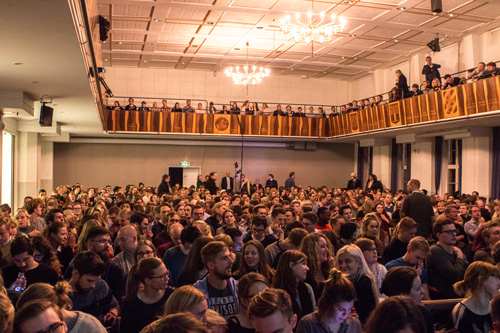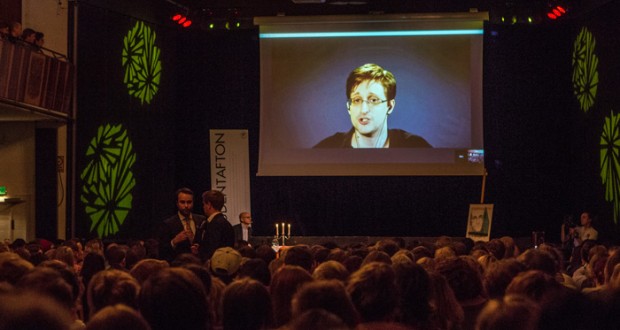During Studentafton on Thursday, Edward Snowden explained why it is so important to fight mass surveillance. Virve Ivarsson is inspired – but wishes that more time had been spent on explaining how this could work in practice.
Half an hour before the doors are opened, the queue reaches far across the cobble stones outside the AF building. Over a thousand students and other interested people pour in, and a moment later, 700 of them keenly sit down on the pale wooden chairs in Stora salen.
For just over a hundred Swedish crowns – and with some luck in the ticket system – they have been able to purchase tickets for Edward Snowdens one and a half hour video conference. An additional 300 people have gotten tickets to watching it all being streamed in Café Athen.
”Was it worth it?”
The first question of the evening might seem comically appropriate for the audience, but is of course directed to Edward Snowden by moderator and Sydsvenskan-journalist Andreas Ekström.
The man who, having leaked top-secret documents regarding the global as well as national mass surveillance from the USA, has been forced to leave his home country and is wanted with a threat of lifetime imprisonment.
And who – it is hard to let go of the awesomness and absurdity in it all – is right now speaking to 700 students in a ballroom on a video conference call from Russia.
”Not only do I think it was worth it, I would do it again, and this time I would do it sooner”, Edward Snowden answers.
The type of globalisation that has made the way for his virtual appearance at Studentafton he also believes might be an explanation for a global increase in surveillance.
”Before, our knowledge of the world was limited to what happened at a local level. As the general circumstances for humanity improves, the worst things going on in the world are readily available in our living rooms every day through TV and the Internet.
The audience is twisting and turning. Edward Snowden is of the opinion that this leads to politicians being forced to do something about everything bad that is going on – even when it is very difficult to know how to do it.
”We have lost the capability of compromising. To say ’yes, there is terrorism, and there will always be terrorism in some form since there will always be individuals who are drawn to the extreme’. The problem today is that politicians have to respond with how to prevent this.”
Edward Snowden talks about the absurdity in how much money in the world is spent on the military when, at the same time, Americans for example are much more likely to die from their own bathroom mats or cops than because of terrorism.
”But the problem is that if you stand up for that viewpoint today, you will lose your seat or your election. But at the same time, if we don’t stand for this – how will we be able to explain our actions for the generations that are to come?”

Generally speaking, these are Edward Snowden’s answers – long explanations and rhetorical questions that would all work wonders as pep talks for any sort of action against mass surveillance.
However, it becomes rather boring if you are already convinced that mass surveillance needs to be stopped and was instead curious about its extent and what we can do to stop it.
This being said, the talk with Edward Snowden at Studentafton is still very interesting.
He talks about how easy it is for governments to get information from its citizens’ Gmail and Facebook accounts, that the USA has not changed its surveillance laws as much as switched names, and that it is difficult to solve the problem on a national level because much of our correspondence today is so global.
Edward Snowden points out that what he has done is not unique. In the 1970s, whistle blower Daniel Ellsberg leaked top secret information on the Vietnam War. Then, the public interest in the information was seen as superior to the crime, and the whistle blower walked. But that was then.
“Now, USA has changed these laws and that is no longer a mitigating factor”, Edward Snowden says.
Both the audience and Andreas Ekström ask fun questions on whether the government could take control over surveillance cameras like in the movies (no, but Webcams, on the other hand), and when Edward Snowden last changed his opinion on something important (he is more positive towards being called a radical after his revelations, if I understood is answer correctly).
However, seeing that Edward Snowden has described the Swedish intelligence service as one of the NSA’s most important allies, it is surprising that no question is asked about surveillance in Sweden.
When Edward Snowden states that the European Parliament have had a vote on whether the EU should grant him asylum, and Andreas Ekström finishes the evening by saying that we should do this again in ten years – but with Edward Snowden there in person – I am reminded of why there is a point for Edward Snowden to turn to his sceptics.
For my own part, Edward Snowden’s information on what law changes have made surveillance possible – coupled with the still inspiring pep talk – yet made the evening well worth my attention.
When I am walking home, thinking about if I can talk in front of my TV without being overheard, it still feels unfortunate that Edward Snowden spent so much time at Studentafton talking about why we should prevent a society built on mass surveillance, and so little time on how.
Aritcle: Virve Ivarsson
Translation: Carl-William Ersgård






